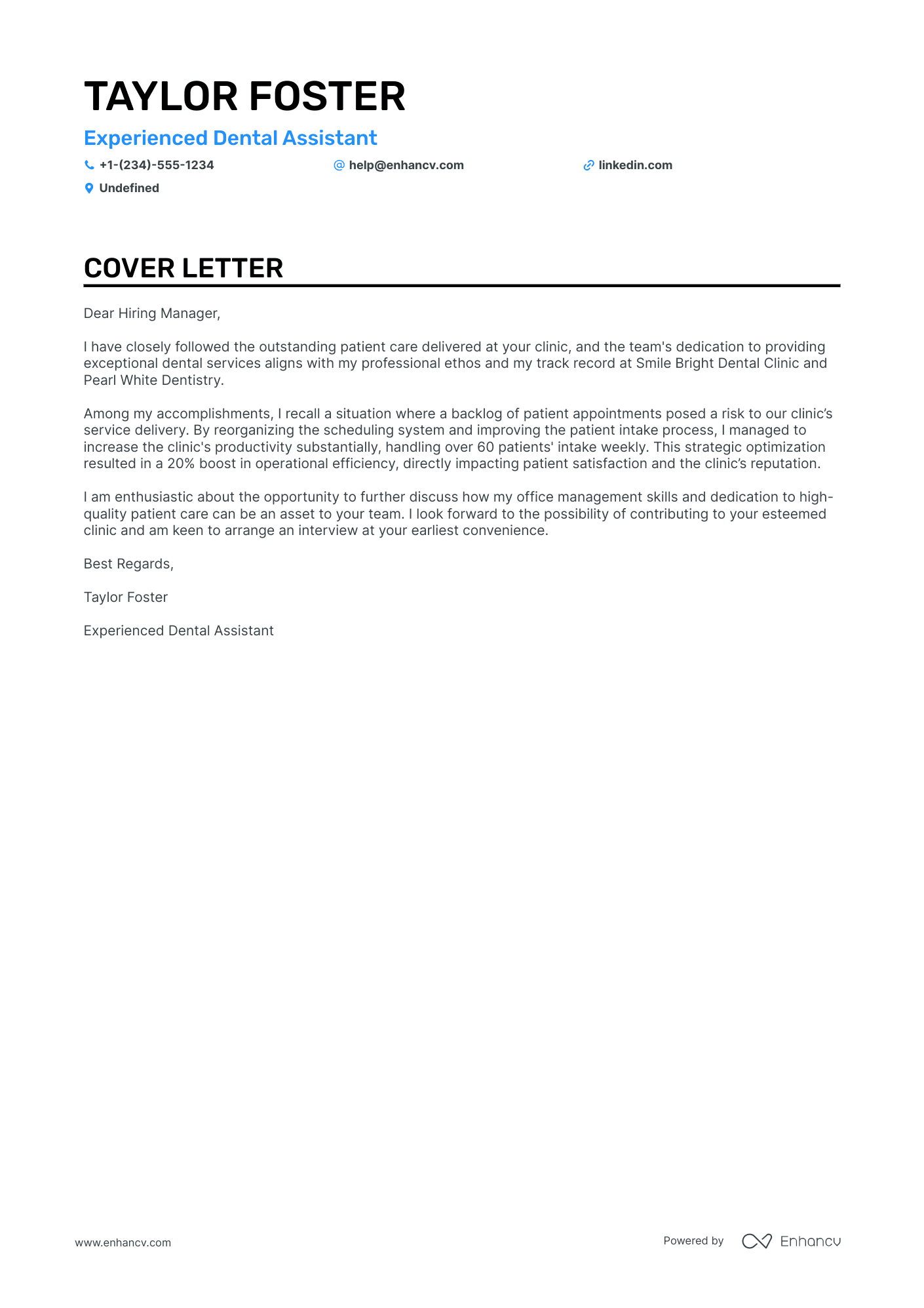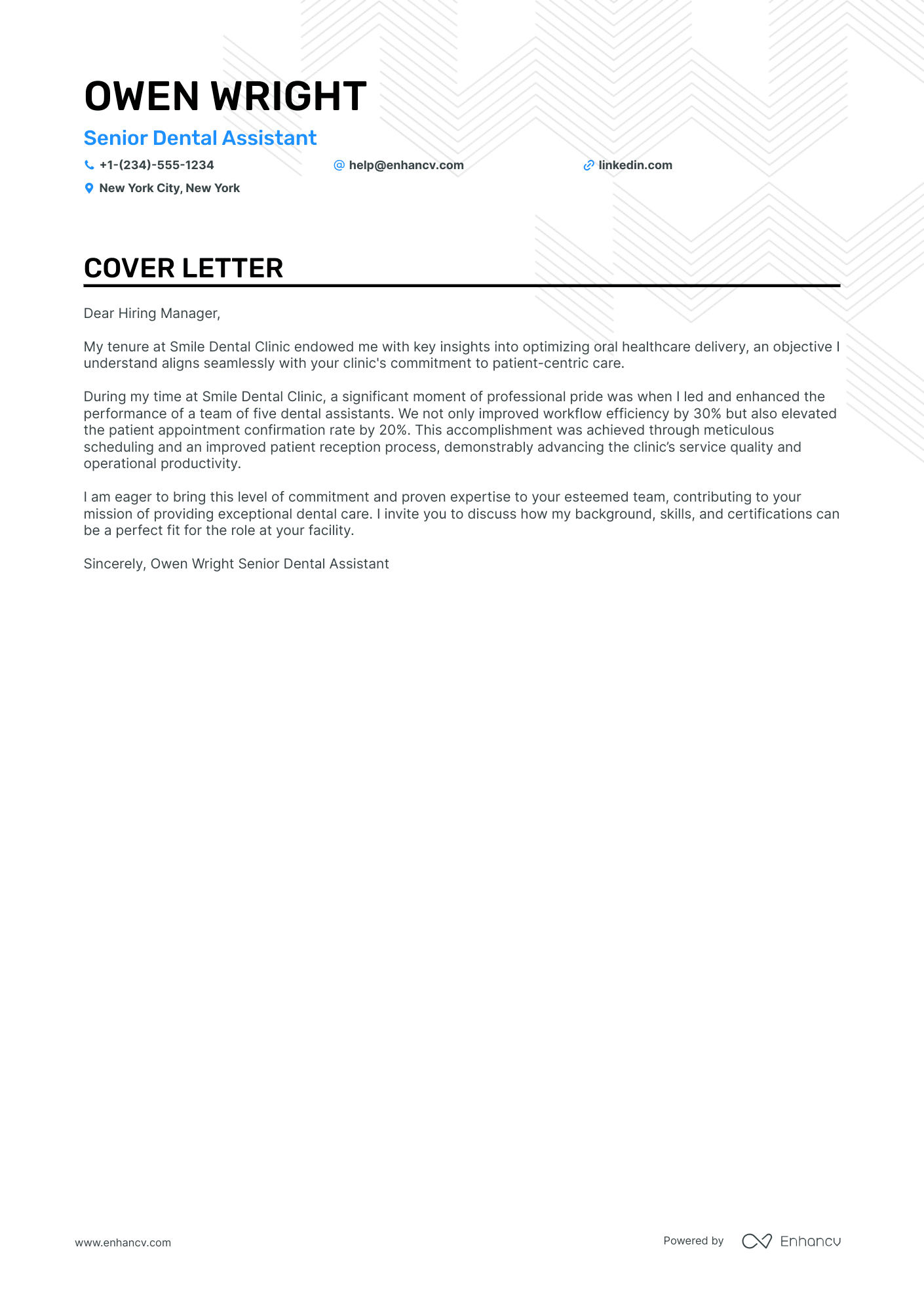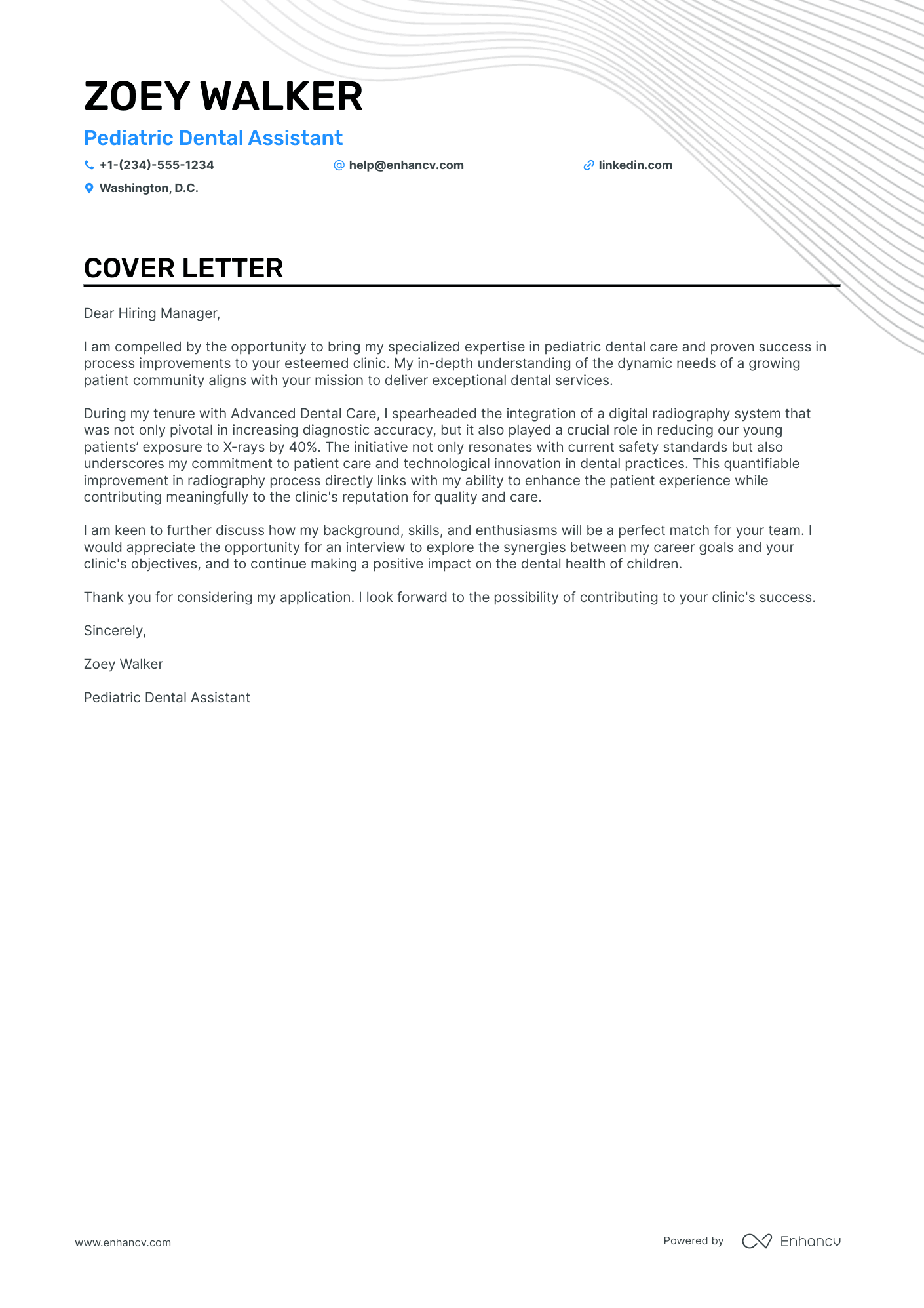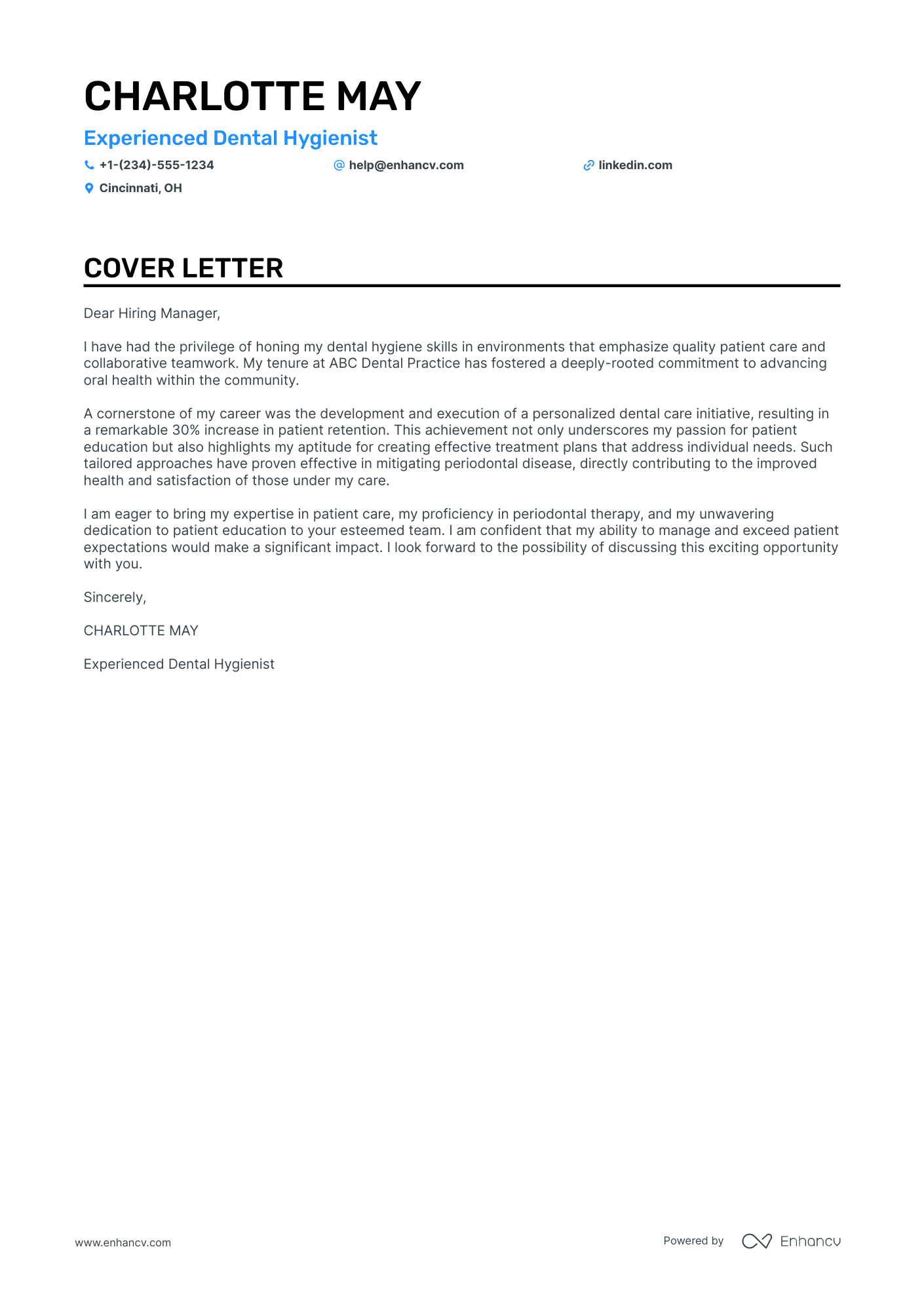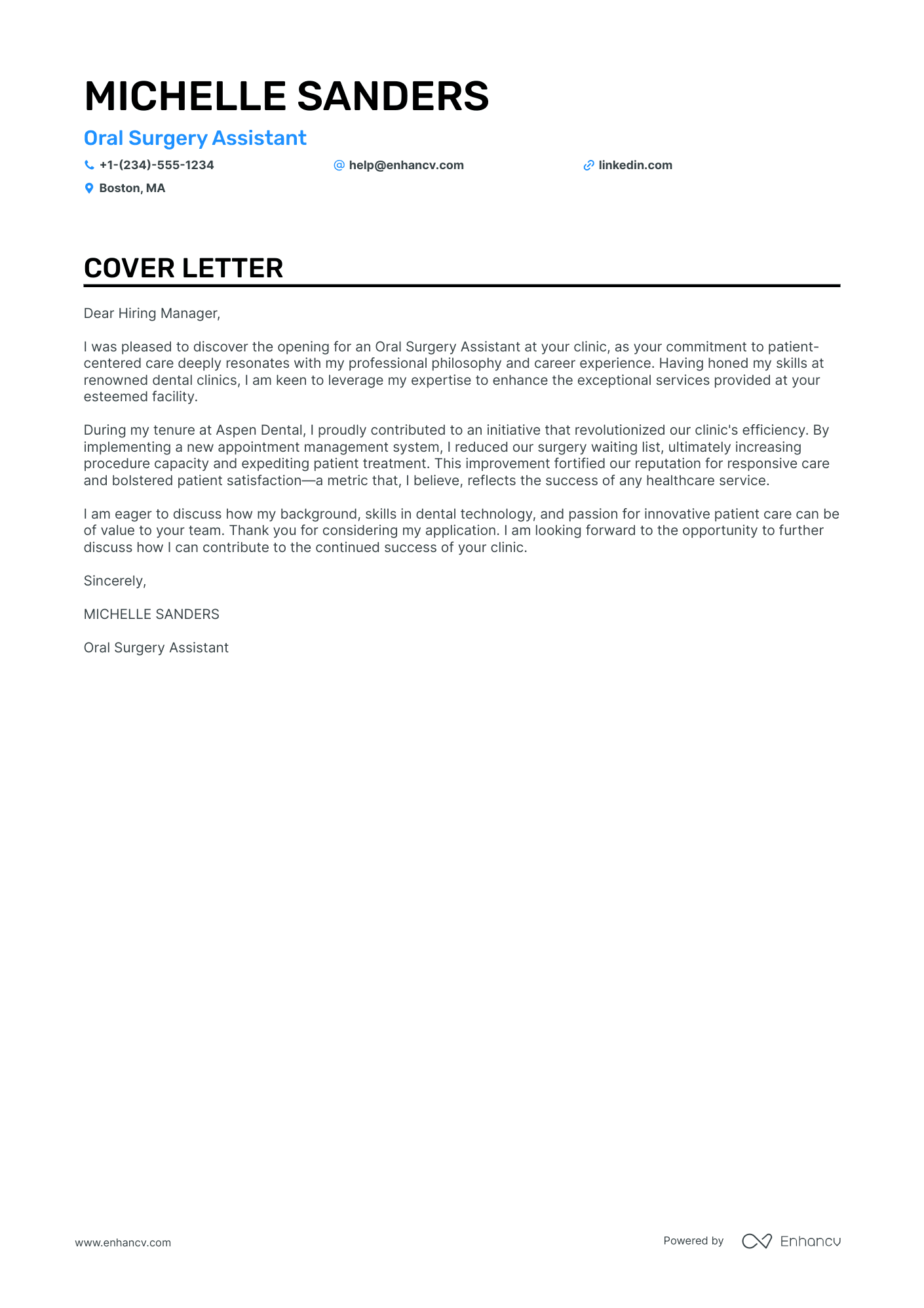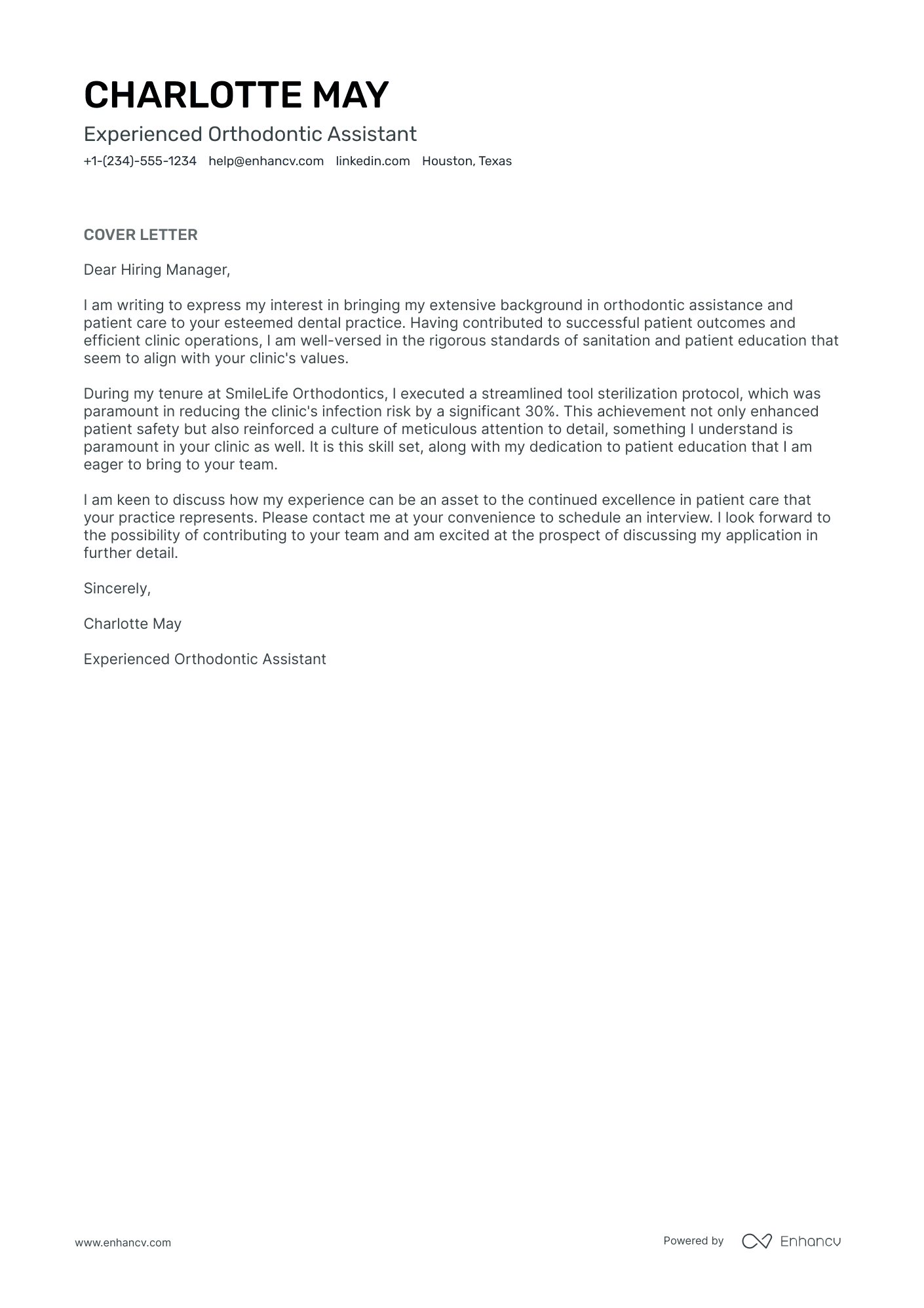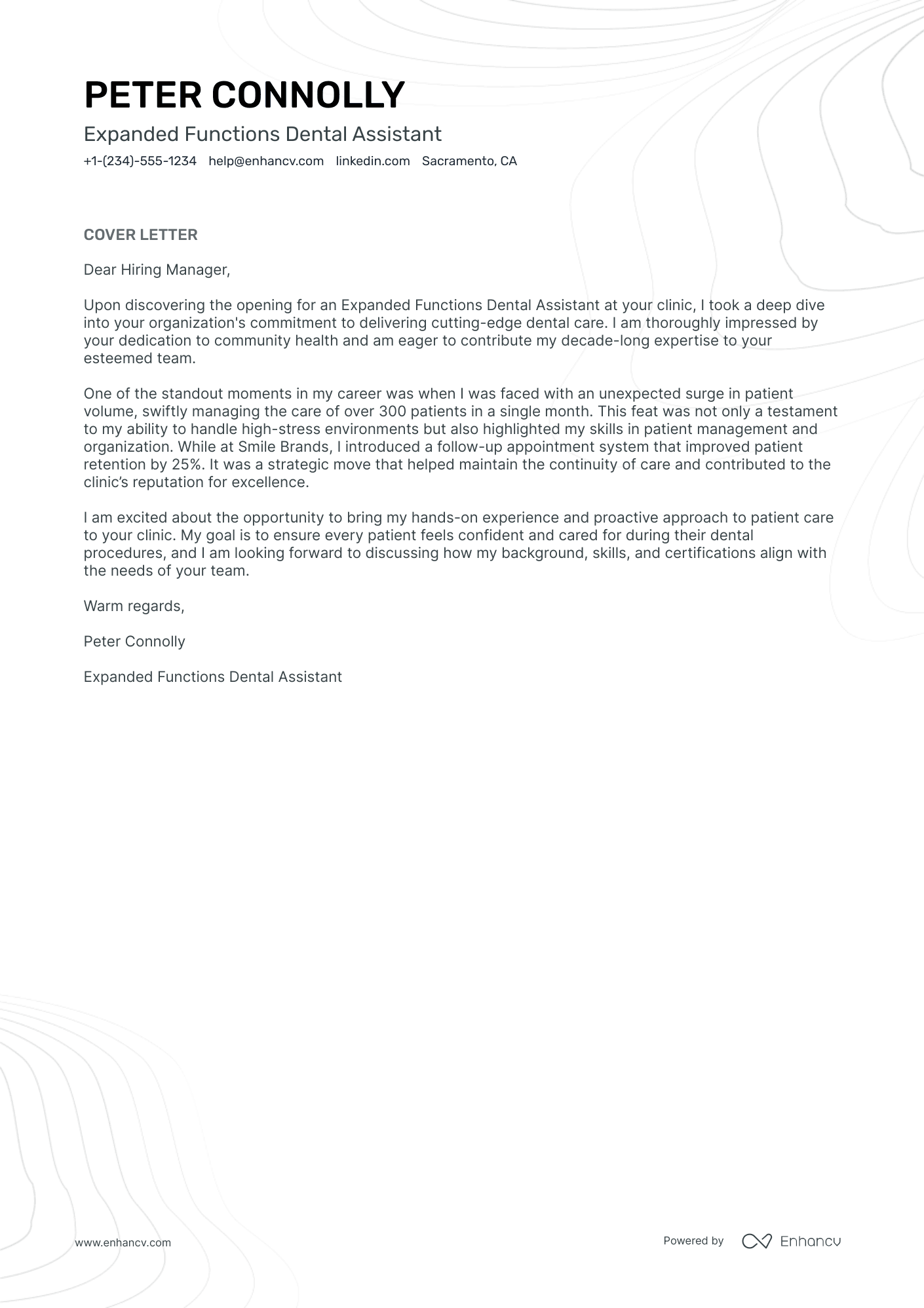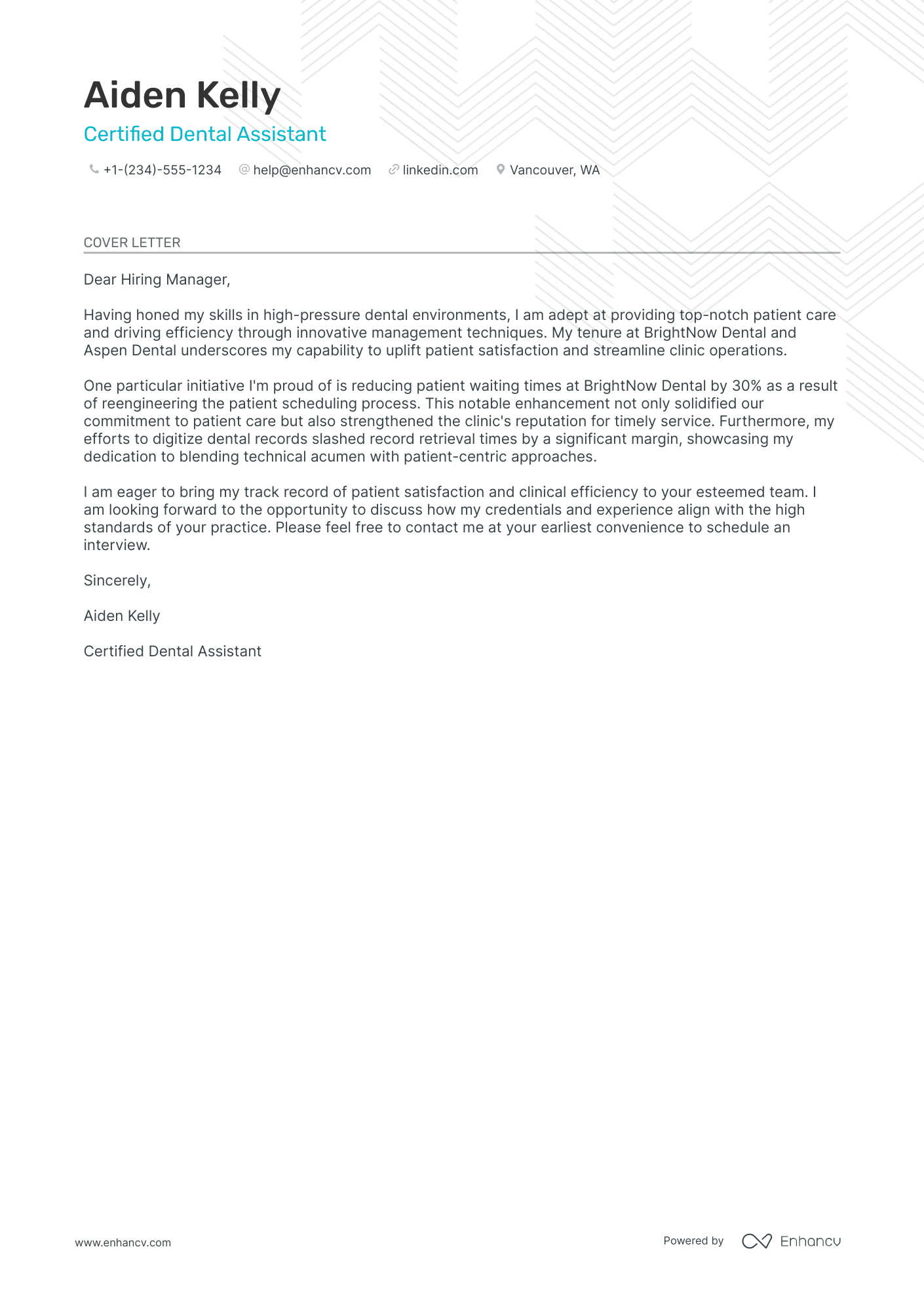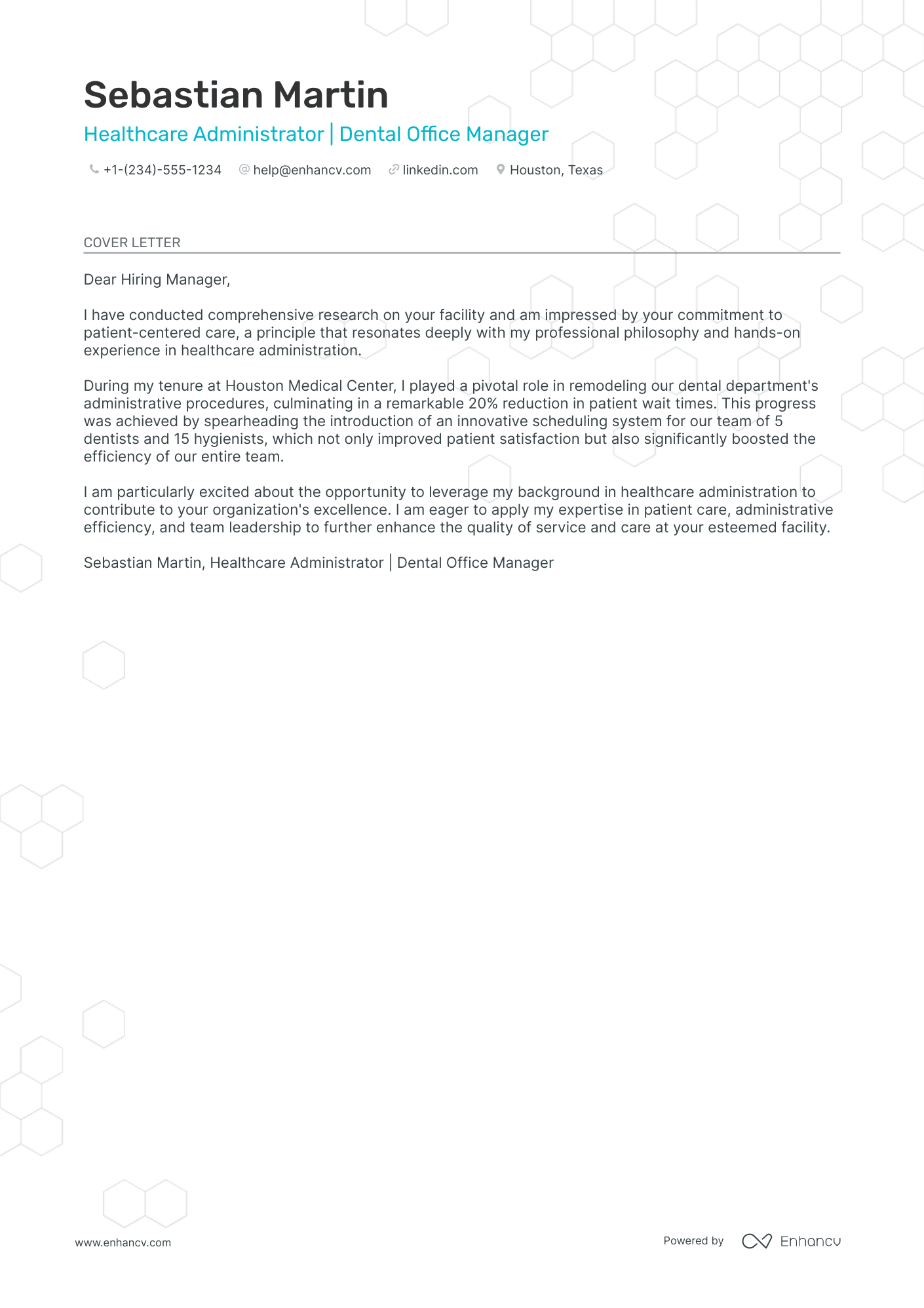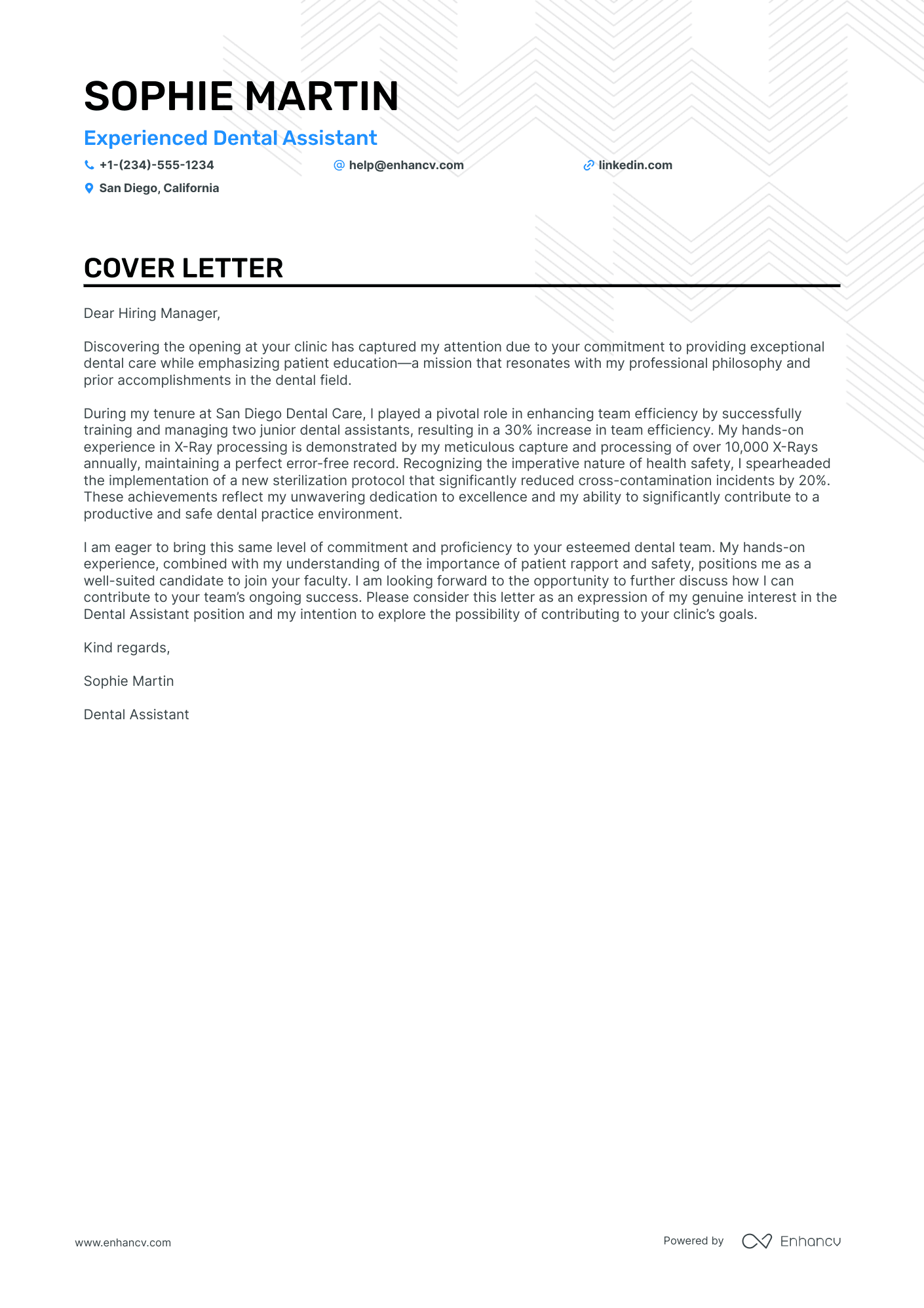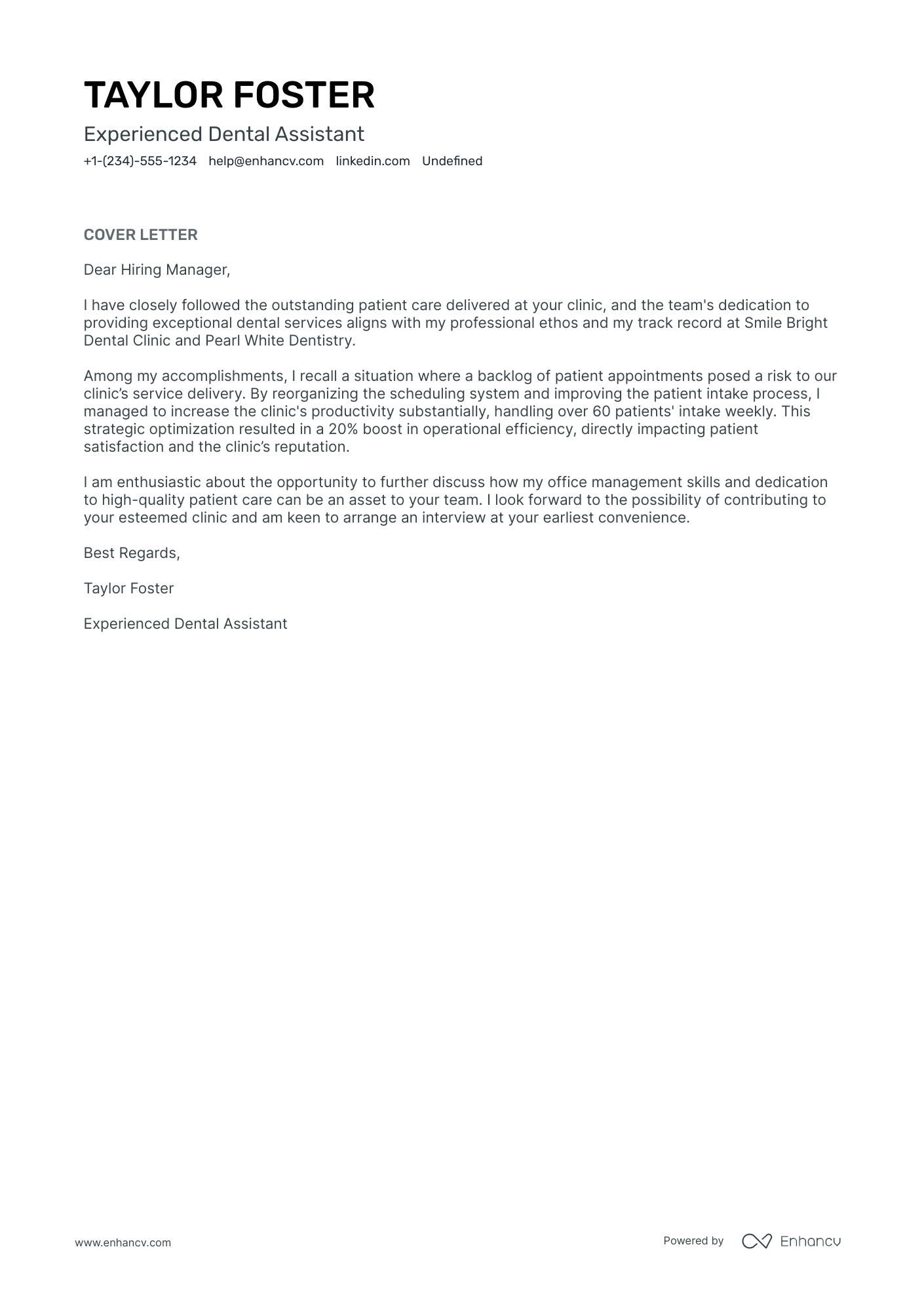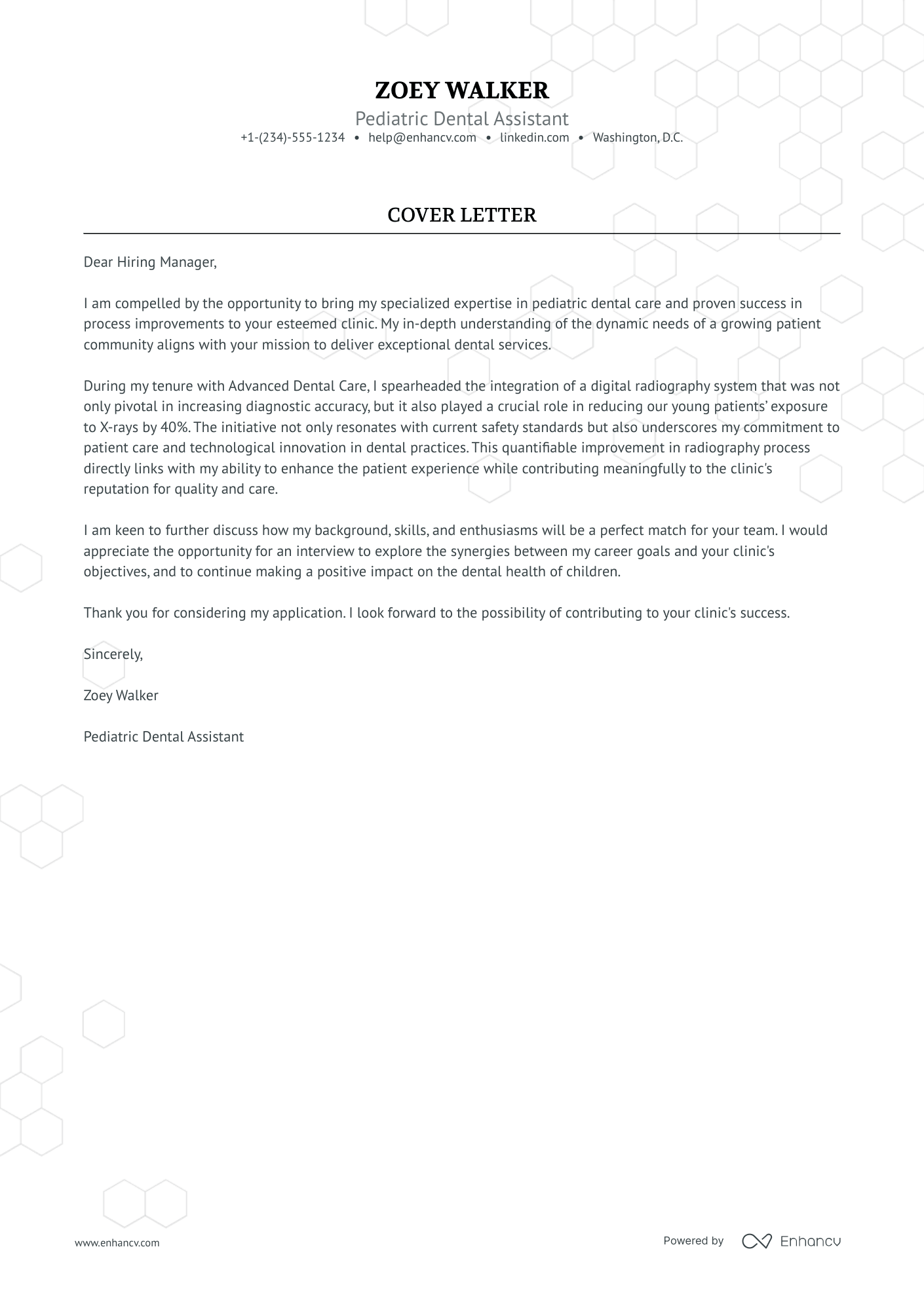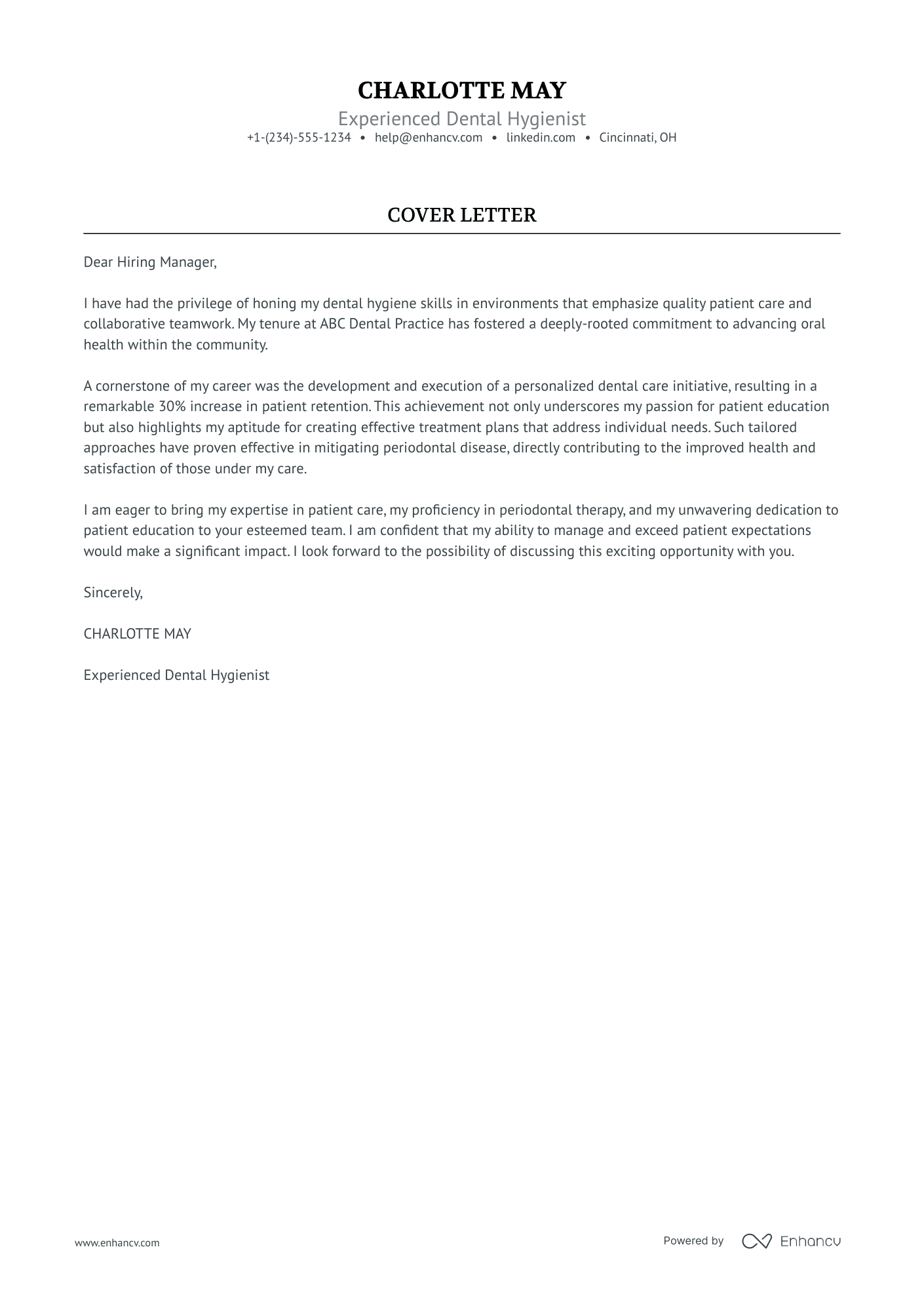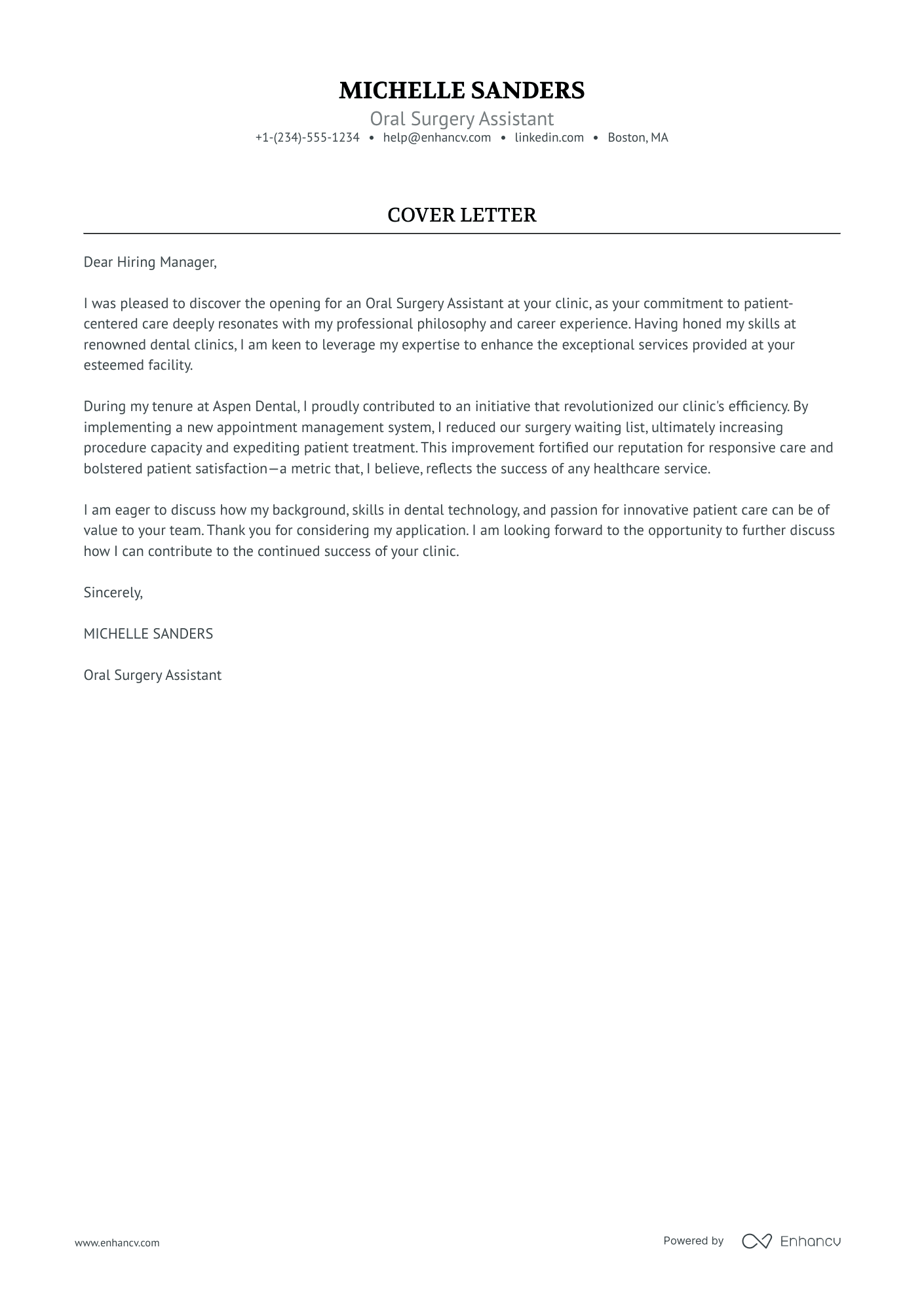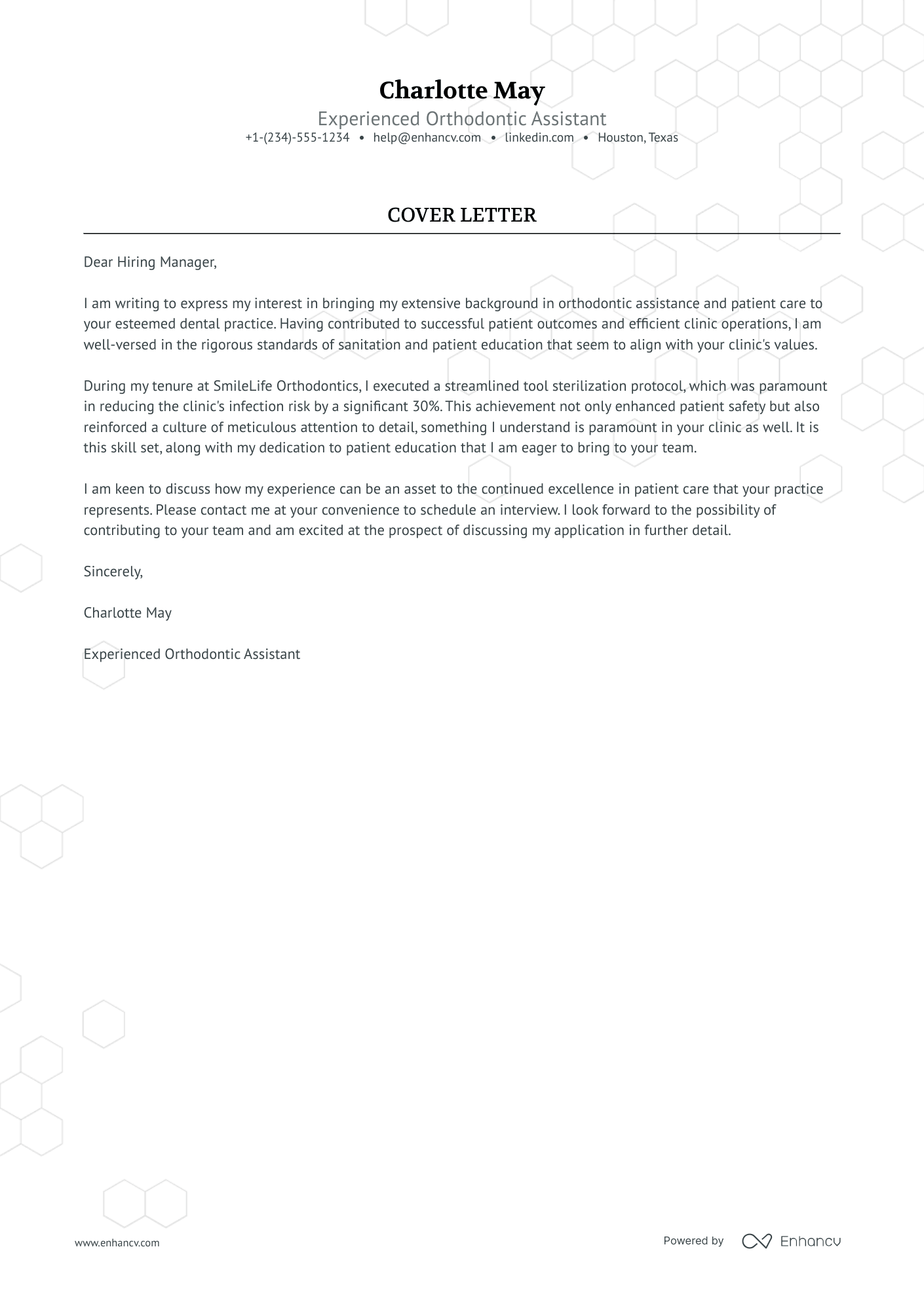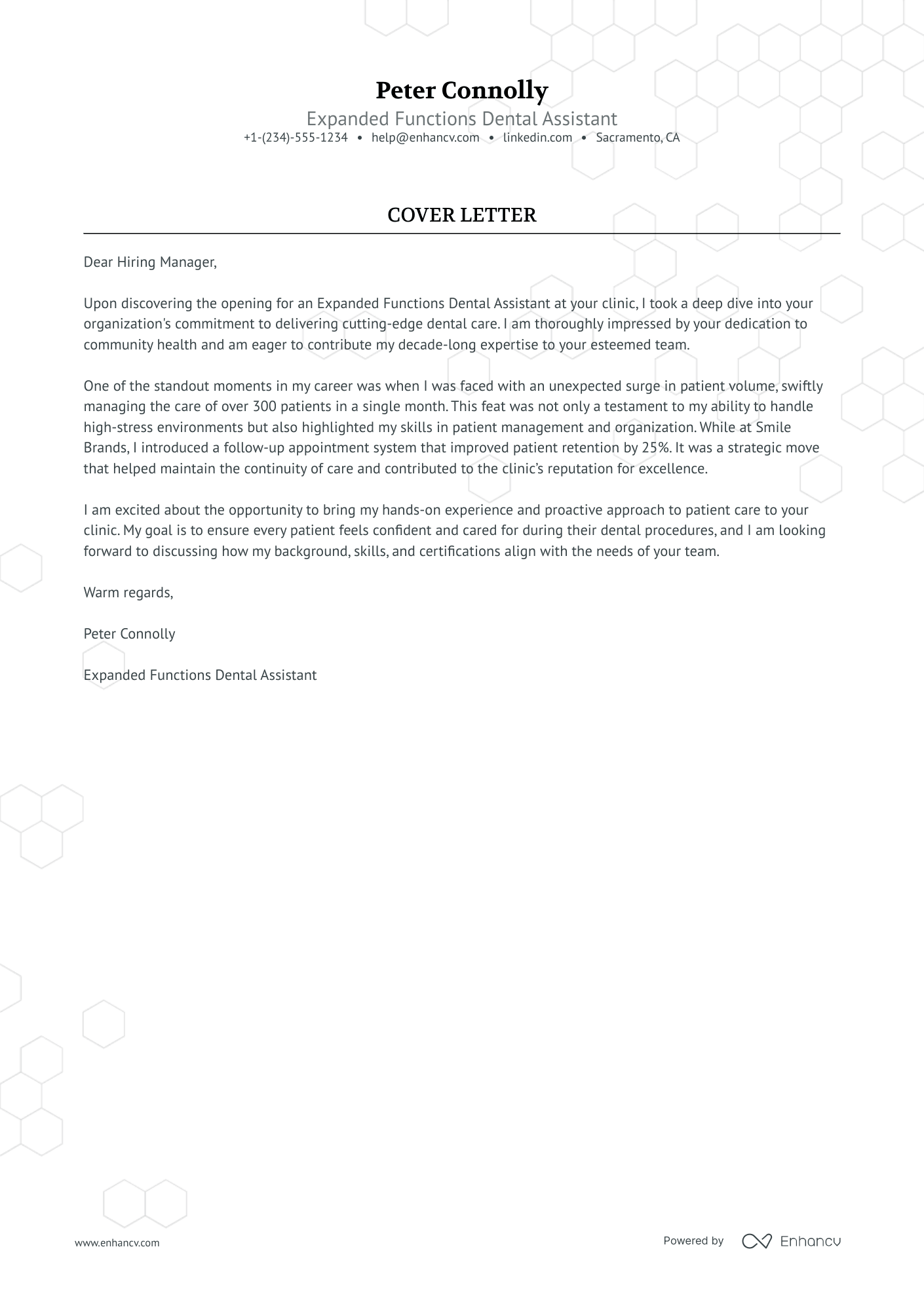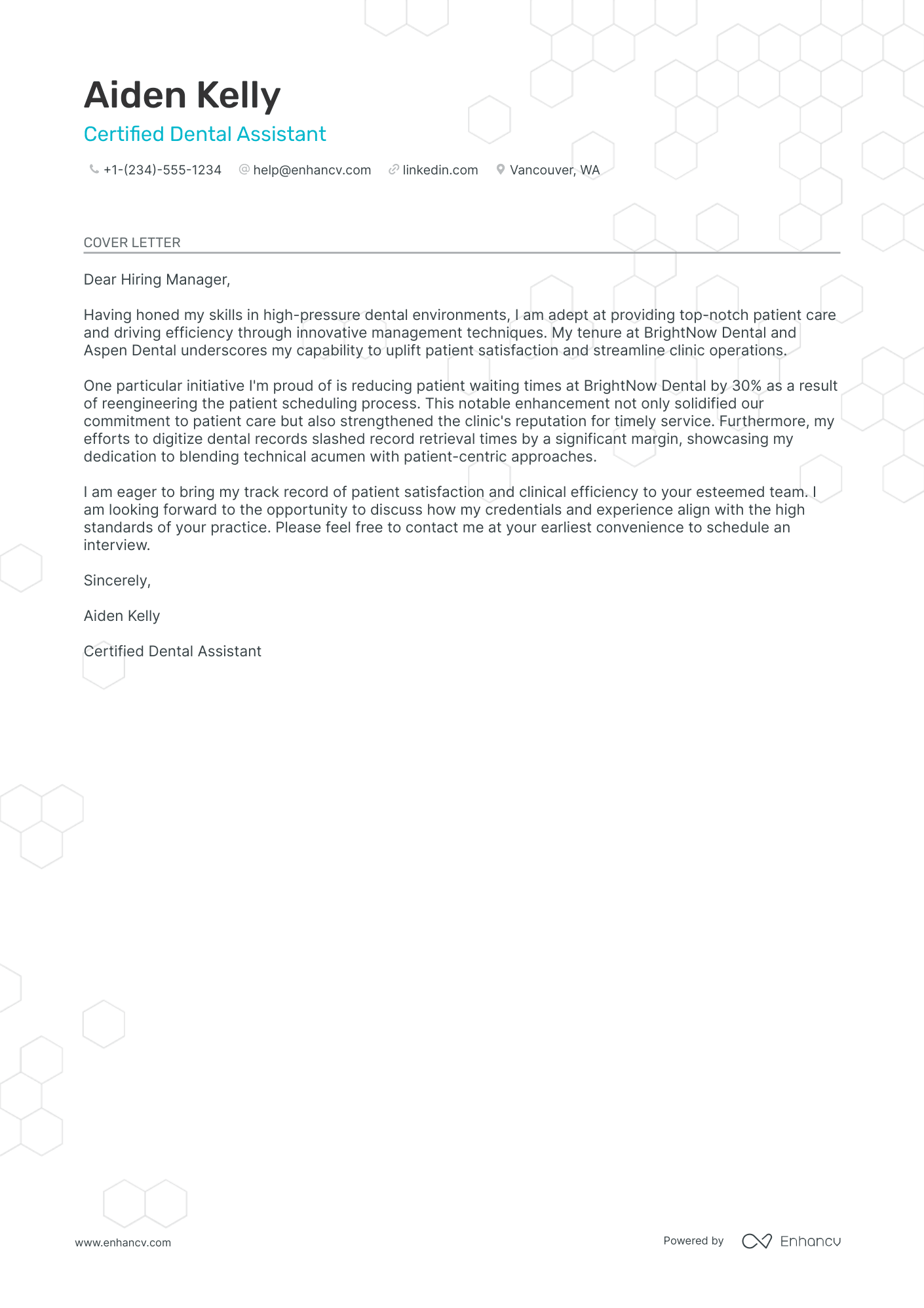Embarking on your job hunt as a dental assistant, you've diligently sent out your resume, only to be met with the requirement of a cover letter. This isn't just a repeat of your resume; it's a chance to spotlight your proudest professional moment and the story behind it. Written formally yet avoiding tired clichés, your cover letter should be a one-page narrative that effectively introduces you to potential employers. Let's begin crafting a letter that stands out as much as your most significant achievement.
- Some inspiration from other professionals' job-winning cover letters;
- The best structure and format for your dental assistant cover letter;
- Insights on how to write about your best achievement to stand out;
- A creative twist on your dental assistant cover letter intro.
Upload your dental assistant resume to Enhancv's AI, which will quickly scan and prepare a job-winning cover letter for you.
If the dental assistant isn't exactly the one you're looking for we have a plethora of cover letter examples for jobs like this one:
- Dental Assistant resume guide and example
- Public Health cover letter example
- Hemodialysis Nurse cover letter example
- Ob Nurse cover letter example
- Nurse cover letter example
- Professional Nurse cover letter example
- Clinical Nurse Manager cover letter example
- Senior Pharmacy Technician cover letter example
- Nurse Anesthetist cover letter example
- Physical Therapist cover letter example
- Expanded Functions Dental Assistant cover letter example
Drop your resume here or choose a file.
PDF & DOCX only. Max 2MB file size.
Dental assistant cover letter example
Alex Johnson
San Francisco, CA
+1-(234)-555-1234
help@enhancv.com
- Emphasize relevant educational background like a Bachelor of Science in Dental Hygiene to establish credibility and suitability for the dental field.
- Highlight practical experience with industry-related technology such as Dentrix software to showcase proficiency in tools that can improve clinic efficiency.
- Demonstrate problem-solving ability through a specific example, like enhancing operational efficiency by implementing a records management system, to show potential value to the prospective employer.
- Focus on soft skills such as dedication to patient comfort and meticulous attention to detail, which are pivotal for roles like Dental Assistant where patient interaction is frequent.
Five tips on formatting your dental assistant cover letter
Do you want to make a good impression on recruiters and, at the same time, follow the best industry advice on writing your dental assistant cover letter?
Make sure to include the following:
- Header and Salutation;
- Introductory paragraph;
- Body paragraph;
- Closing paragraph;
- Signature (this one is up to you).
Remember to use the same modern, simple font for your dental assistant cover letter as you did for your resume (e.g. Lato, Rubik, etc.)
Ensure your dental assistant cover letter is single-spaced and is wrapped around a one-inch margin, like in our cover letter templates.
Once completed, use our cover letter builder to export your dental assistant cover letter in the best format to keep your information intact - PDF.
At the end of the day, your dental assistant cover letter won't be assessed by the Applicant Tracker System (ATS) software, but by the recruiters. Your information should thus be legible, organized, and follow a structured logic.
Why worry about your cover letter? Create one instantly using our free cover letter generator.
The top sections on a dental assistant cover letter
Header with Contact Information: Include your full name, address, phone number, and email to ensure the hiring manager can easily get in touch with you.
Professional Greeting: Address the hiring manager directly (if you know their name) to make your cover letter more personal and show that you’ve taken the time to research the dental practice.
Introduction: Clearly state the position you’re applying for and mention how your skills and experience in dental procedures, patient care, and office administration make you a strong candidate for the dental assistant role.
Body Content (Skills and Experience): Highlight your clinical skills like taking dental X-rays or managing infection control procedures, as well as your interpersonal skills that enhance patient comfort and your ability to work effectively in a team.
Closing and Call to Action: Thank the reader for considering your application, express your enthusiasm for the opportunity to contribute to their dental practice, and politely invite them to contact you for an interview.
Key qualities recruiters search for in a candidate’s cover letter
- Strong communication skills: Crucial for effectively interacting with patients, explaining procedures, and coordinating with dentists and other team members.
- Detail-oriented nature: Essential for maintaining accurate patient records, adhering to infection control protocols, and ensuring the proper sterilization of instruments.
- Manual dexterity: Necessary for assisting with dental procedures, handling small tools, and performing tasks requiring fine motor skills.
- Patient care experience: Valuable for providing comfort to patients, understanding their needs, and delivering a positive experience during dental visits.
- Knowledge of dental terminology and procedures: Important for understanding dentist instructions, educating patients, and managing dental office operations efficiently.
- Ability to work under pressure: Key for maintaining composure during emergency situations, busy clinic hours, and when managing multiple tasks simultaneously.
What greeting should you use in your dental assistant cover letter salutation
A simple "Hello" or "Hey" just won't work.
With your dental assistant cover letter salutation, you set the tone of the whole communication.
You should thus address the hiring managers by using their first (or last name) in your greeting.
But how do you find out who's recruiting for the role?
The easiest way is to look up the role on LinkedIn or the corporate website.
Alternatively, you could also contact the organization via social media or email, for more information.
Unable to still obtain the recruiter's name?
Don't go down the "To whom it may concern path". Instead, start your cover letter with a "Dear HR team".
List of salutations you can use
- Dear Hiring Manager,
- Dear Dr. [Last Name],
- Dear [Practice or Clinic Name] Team,
- Dear Members of the [Department Name] Department,
- Dear [Mr./Ms./Mx. Last Name],
- Dear Selection Committee,
Get creative with your dental assistant cover letter introduction
Recruiters are going to assess plenty of candidate profiles for the role. Thus, anything you do to stand out will win you brownie points.
Use your dental assistant cover letter introduction to share something memorable about your experience.
But before you go down the rabbit hole of creativity and humor, align your message with the company culture.
For example, if you are applying for a role in some startup, use those first two sentences to tell a funny story (about your experience) to quickly connect with the recruiter.
How to select your best achievement for the middle, or the dental assistant cover letter body
You probably feel exhausted by this point in your application: you've dived into all the details of your success and skills in your dental assistant resume.
What else can you include in your dental assistant cover letter body?
Well, for starters, the next three to six paragraphs should show you further value as a professional. Or, why should recruiters choose you?
Think back on a noteworthy achievement that answers key job requirements and dive deep.
Structure your dental assistant cover letter middle as you'd a story: following chronological logic and highlighting outcomes, thanks to skills.
At the end of the day, you'd want recruiters to be able to see you as the best candidate for the role and understand more about who you are and what makes your success unique (and valuable to the role).
Ending your dental assistant cover letter to avoid "sincerely yours"
Yes, this sort of closing statement may work best before your signature.
But you want to give recruiters something more with your dental assistant cover letter ending.
Some professionals choose to go down the path of promises. In a single sentence, they map out what they'd bring about to the role (whether that's a particular technical skill set or personal traits).
Others, decide to be more concrete by thanking recruiters for their time and prompting for their next interview.
Whatever path you choose, remember to always be polite and respectful of the opportunity you've had. Good manners go a long way.
Dental assistant cover letter advice for candidates with no experience
If you're worried about writing your Dental Assistant cover letter and have no professional experience, we sure have some advice for you.
Turn recruiters' attention to your transferable or relevant skills gained thanks to your life and work experience.
Instead of writing about past jobs, focus on one achievement (whether from your volunteering experience, education, etc.) and the skills it has helped you build.
Alternatively, you could focus your Dental Assistant cover letter on your career objectives and goals. Always remember to make those relevant to the job you're applying for by detailing how you see yourself growing as part of the company.
Recruiters would be way more impressed with candidates who fit the job profile and can bring about plenty of skills and vision to the table.
Key takeaways
Turning your dental assistant cover letter into a success is all about staying authentic to yourself and relevant to the job:
- Be creative with your dental assistant cover letter introduction by stating something you enjoy about the company (that is genuine) or about your skill set (to get the recruiters' interested);
- Use single spacing and have a one-inch margin wrapping all around the content of your dental assistant cover letter;
- Select just one past achievement from your career or life to tell a story of how you've obtained job-crucial skills and how they'd be beneficial to the role;
- The finishing paragraph of your dental assistant cover letter doesn't necessarily have to be a signature but could be a promise of what you plan to achieve in the role;
- Instead of focusing on your lack of experience, spotlight your transferable skills, one relevant achievement, and career dreams.
Dental Assistant cover letter examples
By Experience
Entry Level Dental Assistant
Senior Dental Assistant
By Role
